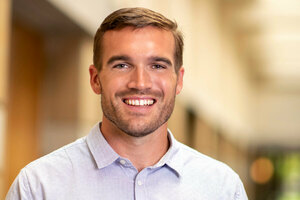
Sean Raming is a second-year peace studies and history Ph.D. student researching militarism in the U.S. Before joining the Kroc Institute, he lived across the U.S., worked as a commercial fisherman for nearly seven years, and even played in a band that toured across Europe. He says that he followed his heart, and that’s how he ended up at the Institute.
In this interview, Sean shares some insights into his work, passions, and future plans. Sean is fascinated by the war in Vietnam, the antiwar movement including the GI movement within the military, and the impact of war narratives on U.S. society.
Why did you decide to pursue a Ph.D. at the Kroc institute?
My Master's research involved the antiwar movement of the Vietnam era. There's a whole school of historians that study the Cold War and the war in Vietnam from a critical perspective. Many of them were sort of foundational members back in the day for peace studies.
I see myself as bringing back some topics that are oftentimes perceived as outdated in peace studies, but thinking about them in new ways, with new perspectives and theories and applying interdisciplinary skills that we have today. I’d say I am combining my passion for history and peace because I think we live in a hyper-militaristic society, and there are ways to subtly shift our perspectives on those things.
What made you so interested in militarism in the first place?
I just had a raw fascination with the U.S. war in Vietnam. I've always been interested in culture and things that happened around the same time like the Civil Rights Movement, the counterculture, women’s liberation, and the new left. When I studied in France, I got to see our contemporary culture from an external perspective; I got to understand what people abroad thought of the United States.
How would you describe your Ph.D. experience so far?
These studies have challenged me, and they forced more responsibility onto me. Peace studies is a complex and diverse field, mastering it and relating it to history is not easy. I am really thankful for the support that we get from the Kroc Institute and from the faculty here. It's been special, giving me all kinds of opportunities.
For example, just recently, I recorded a podcast on nuclear weapons issues, and this is emblematic of the things we get to do.
What would you like to do after graduation?
Being in my second year, it’s a hard question to answer. I think to some extent, Kroc will always be a part of me. I have recently been thinking a lot about doing peace in pedagogy, through a job as a history professor, for example. I love teaching, and I love interacting with young people. I think that the stage of undergraduate studies is a really interesting time in life when it’s important to challenge things that so many of us grow up with, like idolizing masculinity or grappling with white supremacy and patriarchy.
Where would you place yourself on the strategic peacebuilding wheel?
With my interest in teaching, it’s definitely education. Infusing peace into history and pedagogy is really motivating and a big part of my mission here. I’d also place myself somewhere dealing with global and transnational threats because of my interests in nuclear weapons and militarism. I see myself close to the structural and institutional change area too, because I dream of the day when we spend less money on weapons and more money on people in the streets everywhere.